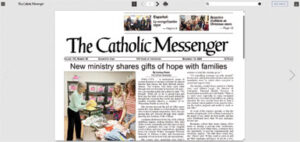 By Barb Arland-Fye
By Barb Arland-Fye
Editorial
We’ve all done it — made a trip to urgent care for stitches, broken bones or a sinus infection, visited our health care provider for check-ups or routine physicals or taken our children for check-ups. How many times have we stood in line at the pharmacy to fill a drug prescription and thanked God that insurance covered the lion’s share of the cost? The point: we all depend on quality, affordable health care to thrive.
We also acknowledge that health care coverage is a big, expensive deal, as evidenced by the longest government shutdown in U.S. history — 43 days — which ended late Nov. 12. The issue is front and center because enhanced premium tax credits (PTCs) under the Affordable Care Act (ACA) will expire at year’s end. Not extending the tax credits will cause health insurance rates to skyrocket for millions of people, especially those struggling most to make ends meet. Unable to afford health care, they, and all taxpayers, will deal with the consequences down the road.
In our state, 112,000 Iowans depend on the premium tax credits provided under the ACA in 2025, including early retirees, farmers and entrepreneurs, the Iowa Insurance Division’s spokesperson told The Catholic Messenger. An estimated $630 million in taxpayer subsidies went to the 112,000 Iowans, or about $5,625 each.
These Iowans represent approximately 5% of our state population of 3.19 million. About 53% of Iowans have health insurance plans through their employers, 36% through Medicare and Medicaid and 1% through the military. About 5% are uninsured (https://tinyurl.com/36xfwvbm).
The percentage of Iowans who depend on ACA subsidies shouldn’t matter. No one should have to forgo health insurance coverage because they can’t afford it. For decades the U.S. Conference of Catholic Bishops (USCCB) has championed affordable health care as a basic human right.
In a letter to Congress Oct. 10, the bishops said, “The premium tax credits established by the ACA are an important tool for ensuring affordable access to health care for millions of Americans by lowering their premiums on the ACA marketplaces.” They added a caveat, “The enhanced PTCs should be extended, but must not continue to fund plans that cover the destruction of human life, which is antithetical to authentic health care.” The bishops identified five key principles for health care policy: “it must respect human life and dignity, honor conscience rights, be accessible for all, be truly affordable, and be comprehensive and high-quality.”
Democrats and Republicans remain divided on extension of the tax subsidies. Cost is a major consideration. The Congressional Budget Office projects “that a permanent extension of the subsidies would cost $335 billion over the next ten years,” according to KFF, a health policy information organization.
KFF reports that “22 million out of 24 million marketplace enrollees currently receive a tax credit and pay for their healthcare on “a sliding-scale share of their household income, based on a formula set by Congress” (https://tinyurl.com/4hyysauk).
An estimated 4.2 million Americans would become uninsured if the tax credits end, Iowa Public Radio reported Nov. 6, citing the Congressional Budget Office. Proposed integrity rules would cause another 900,000 people to be uninsured.
As faithful citizens, we can advocate that Congress reprioritize federal budget expenditures to ensure that every American has access to decent, affordable health care coverage. That is a first step. A robust discussion on restructuring the ACA is also necessary.
“The temporarily enhanced federal subsidies Congress passed in 2021 and 2022 have only masked the underlying problems that have existed in the Affordable Care Act since its creation,” Iowa Insurance Commissioner Doug Ommen states on his agency’s website. “Without reform, the ACA will fail the very people it was supposed to help — farmers, small business owners, and early retirees who need affordable options in the individual market.” Ommen said premium payments would increase 97%, or $1,080 annually, from $1,116 to $2,196 per year without the expanded Inflation Reduction Act (IRA) subsidies.
He identifies these structural flaws of the ACA:
- Federal subsidies are income based only. “This ignores age and actual health risk, which distorts the market and makes premiums more expensive.”
- The federal subsidy cliff at 400% of the Federal Poverty Level (FPL). “A single dollar of additional income can cause families to lose all financial assistance. This is extremely problematic as Iowans estimate what they expect their income for the year to be before the year starts.” Ommen said this disincentivizes Iowans to earn more and can also force them to repay thousands of dollars in premium tax credits if their income unexpectedly increases.
- Flawed age-banding. Age banding sets limits on how much more older adults can be charged compared to younger adults. The ACA requires a 3:1 ratio, rather than the more actuarially sound 5:1 ratio.
Here’s what we can do:
- Read KFF’s explanation of the ACA (https://tinyurl.com/yza5sjf8).
- Read the Iowa Insurance Commissioner’s report (https://tinyurl.com/d55yr2f4).
- Read the USCCB’s statements and letters on affordable health care (https://tinyurl.com/bdcp84v4), (https://tinyurl.com/mtmxs6ub).
- Advocate. Ask our Congress members (congress.gov) to support extension of the ACA premium tax credits. Follow federal legislation through congress.gov and USCCB (usccb.org).
“The first right of the human person, the right to life, entails a right to the means for the proper development of life, such as adequate health care” (Ethical and Religious Directives, USCCB).
Barb Arland-Fye, editor emeritus
(barbarland85@gmail.com)









